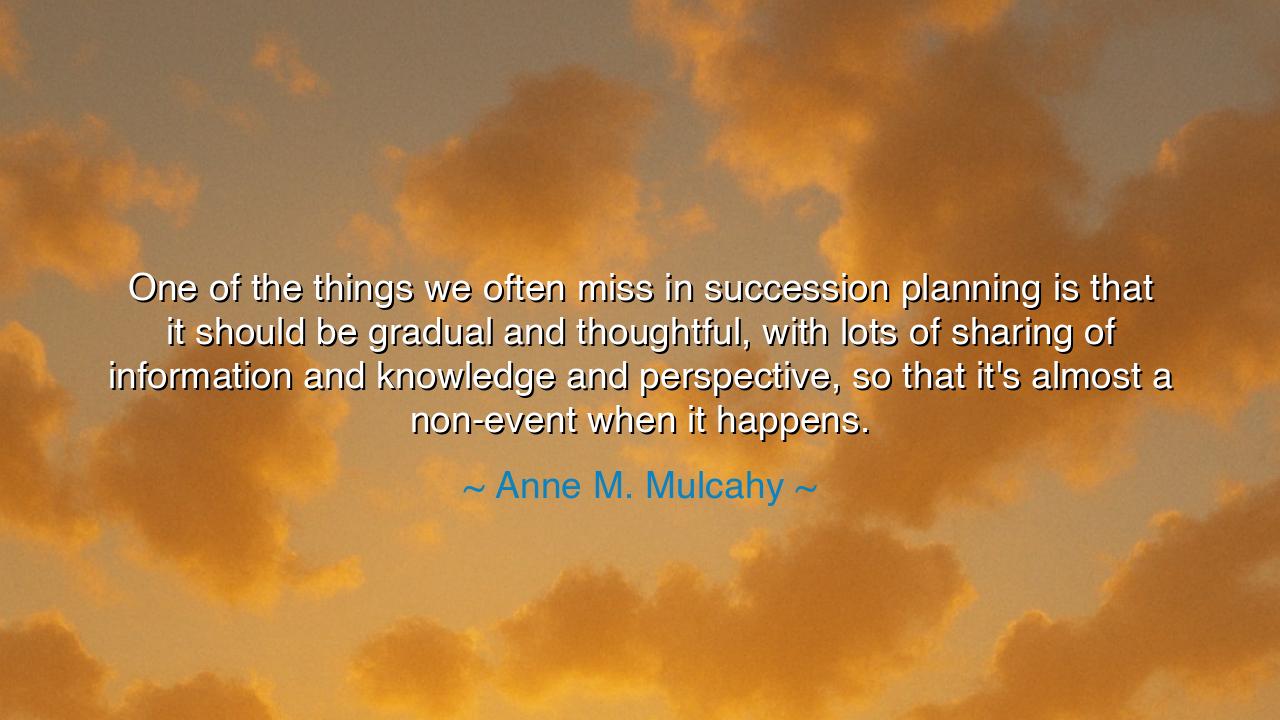
One of the things we often miss in succession planning is that it
One of the things we often miss in succession planning is that it should be gradual and thoughtful, with lots of sharing of information and knowledge and perspective, so that it's almost a non-event when it happens.






Hear the wise counsel of Anne M. Mulcahy, a leader who guided a great company through storm and uncertainty, who declared: “One of the things we often miss in succession planning is that it should be gradual and thoughtful, with lots of sharing of information and knowledge and perspective, so that it's almost a non-event when it happens.” In this utterance lies a profound lesson on leadership, continuity, and the humble responsibility of passing the torch. For succession is not merely the replacement of one figure with another—it is the weaving of continuity, the preservation of vision, and the gentle guiding of hands so that the work of many may endure beyond the life of one.
Mulcahy herself, once the head of Xerox, understood this truth not in abstraction but in the furnace of reality. She stepped into leadership at a time of great crisis, when the company faced collapse. In such times, succession could not be careless, for the destiny of thousands of livelihoods and the survival of an institution depended on it. From her experience, she discerned that succession planning is not an act of haste but of patience, not a sudden leap but a long, steady preparation. Like the careful planting of seed, it must be tended until it bears fruit, so that when the day of change arrives, the soil is ready, and the harvest is sure.
History bears testimony to her wisdom. Consider the story of Alexander the Great. Though he conquered the known world, he died without naming a clear successor. The result was chaos: his empire, vast and glorious, fractured into warring kingdoms. Contrast this with Marcus Aurelius, who raised and educated his son Commodus to rule after him, though even here fate revealed the danger of poor judgment in succession. The lesson is clear: when succession is left to chance, even the mightiest empires may crumble. But when it is approached with thoughtfulness, with sharing of knowledge and perspective, the transition becomes smooth, and the legacy endures.
Mulcahy’s words remind us also of humility. Too often leaders cling to power, fearing the day of their departure, and so they hoard wisdom and guard decision-making. But such fear breeds weakness, for when the inevitable day comes, the next generation stands unready. True leadership, she teaches, is not in holding the throne but in preparing others to sit upon it. The greatest leaders are those who labor so diligently in sharing knowledge that their departure seems almost invisible—an event so well-prepared that it passes with the gentleness of a sunrise.
This principle does not belong to rulers and executives alone; it belongs to all. In families, in communities, in every place where responsibility passes from one hand to another, the same truth holds. The parent must teach the child not only by words but by example, so that the wisdom of one generation flows into the next. The teacher must nurture the student, the elder must guide the youth, the craftsman must pass on his skill—so that continuity is preserved, and the chain of life is never broken.
The lesson is clear: let succession never be sudden, careless, or prideful. Let it be gradual, thoughtful, and filled with open sharing. Begin early, not when the end is near. Build trust, teach generously, and let go with grace. Then, when the moment arrives, it will not be a crisis but a natural unfolding, not an earthquake but a calm and steady passing of light from one lamp to another.
So I say unto you: live not for yourself alone but for those who will come after. Teach what you know, share what you have seen, pass on your strength and your perspective. For as Anne Mulcahy declared, succession should be so well-prepared that when it comes, it is almost a non-event. This is the true measure of a leader: not that they shine while they stand, but that their light endures long after they have stepped aside.
Thus her words endure, reminding us that every life, every role, every responsibility is part of a greater chain. We are not only keepers of our time, but guardians for those who will follow. To plan succession with wisdom is to honor both past and future, ensuring that the work of today becomes the foundation for tomorrow’s greatness.






AAdministratorAdministrator
Welcome, honored guests. Please leave a comment, we will respond soon